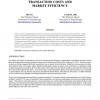Free Online Productivity Tools
i2Speak
i2Symbol
i2OCR
iTex2Img
iWeb2Print
iWeb2Shot
i2Type
iPdf2Split
iPdf2Merge
i2Bopomofo
i2Arabic
i2Style
i2Image
i2PDF
iLatex2Rtf
Sci2ools
ICIS
2001
2001
Transaction Costs and Market Efficiency
Previous research suggests that a decline in transactions costs leads to improved economic efficiency. In this paper,weshowthatsuchadeclinewillintroduceincreasinglyuninformedconsumersintoestablished markets. Using a model of financial market inefficiency, we show that this increase in uninformed individuals can increase market risk (volatility), can decrease efficiency, and may reduce social welfare even when market participants are perfectly rational. We then test the predictions of our model using data on the retail equities market. Our results suggest that securities that have a large proportion of small trades (presumably disproportionately from small, online retail investors) tend to be less efficient by conventional measures, consistent with our model predictions.
Financial Market Inefficiency | ICIS 2001 | Improved Economic Efficiency | Information Technology | Retail Equities Market |
| Added | 31 Oct 2010 |
| Updated | 31 Oct 2010 |
| Type | Conference |
| Year | 2001 |
| Where | ICIS |
| Authors | Bin Gu, Lorin M. Hitt |
Comments (0)

